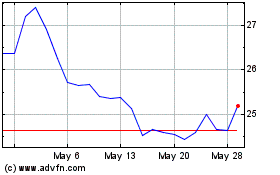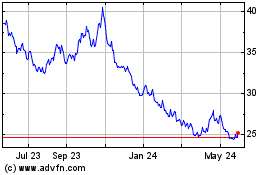Leveraged and Inverse ETFs: Suitable Only For Short Term Trading - ETF News And Commentary
02 April 2012 - 8:53PM
Zacks
ETFs have gained tremendous popularity in recent years due to
several advantages that they offer to the investors, including low
costs, tax efficiency and transparency. As of the end of February
2012, assets in US listed ETFs totaled approximately $1.2 trillion,
up 14% year-over-year (per data from ETF Industry Association).
Most of these funds can be used by the investors very easily and
effectively to achieve their investment aims. (Read: A Primer on
ETF Investing)
However not all ETFs are straightforward; some of them like the
leveraged and inverse ETFs are highly complex financial instruments
which should be used only by the professionals who understand them
properly. (Read: Understanding Leveraged ETFs)
Leveraged and inverse ETFs, also known as geared ETFs, seek to
track a multiple or opposite/opposite multiple of an underlying
index. To accomplish their objectives, these ETFs employ various
investment strategies through the use of swaps, futures contracts,
and other derivative instruments.
These ETFs are designed to achieve their stated performance goal
on a daily basis. Over a period longer than one day their
performance can differ significantly from their stated daily
performance objectives.
To illustrate, let us take the simple hypothetical example of an
index with a starting value of 100, and a loss of 10% on Day 1,
followed by a gain of 10% on Day 2.
|
|
Day 1 Closing Value
|
Day 2 Closing Value
|
Net Return
|
Expected Return
|
Difference from expected return
|
|
Index
|
90
|
99
|
-1
|
|
|
|
2x ETF
|
80
|
96
|
-4
|
-2
|
-2
|
|
3x ETF
|
70
|
91
|
-9
|
-3
|
-6
|
|
-1x ETF
|
110
|
99
|
-1
|
1
|
-2
|
|
-2x ETF
|
120
|
96
|
-4
|
2
|
-6
|
|
-3x ETF
|
130
|
91
|
-9
|
3
|
-12
|
So, at the end of Day 2, the index ended with a loss of 1%, but
the leveraged and inverse ETFs lost between 1% and 9%.
Now let us look at the real-world example of the performance
S&P 500 and related leveraged and inverse ETFs during 2011.
S&P 500 returned 2.11% during the year but all geared ETFs
resulted in losses to the investors who held them for the full
year.
|
S&P 500
|
SSO (2x)
|
UPRO (3x)
|
SH (-1x)
|
SDS (-2x)
|
SPXU (-3x)
|
|
2.11%
|
-2.92%
|
-11.88%
|
-7.82%
|
-18.82%
|
-32.35%
|
In the above case, if the investors expected the three times
leveraged and inverse leveraged ETFs to deliver returns of 6.33%
(2.11*3) and -6.33% (2.11*-3) respectively, then they were in for a
rude shock, as the funds actually lost 11.88% and 32.35%
respectively during the year.
These examples clearly illustrate that such ETFs should not be
held as long term investments. They match their stated objective on
a “daily basis” but for any other time period, their performance
varies significantly mainly due to the compounding factor.
Though compounding can have both favorable and adverse effects
on the return; in times of volatility the effects are usually
negative. (Read: Three Worst Performing Leveraged ETFs of 2011)
We are not saying that these ETFs should not be used; the
question is how they should be used. These investments need to be
monitored and rebalanced on a daily basis in order to maintain the
desired exposure.
The sponsors of these ETFs disclose all the related risks in the
prospectus but how many of the retail investors actually read the
prospectus and do their homework before making investments. For
such retail investors plain vanilla ETFs are the best investment
tools.
Geared ETFs are specialized tools useful for specialized
strategies. Professional investors and traders can use them very
effectively for short-term trades, either to make bets on the
movement of certain types of investments or to hedge a
portfolio.
Investors also need to keep in mind that leveraged or inverse
ETFs are usually more costly than traditional ETFs. Also since they
reset daily, they may be less tax-efficient than traditional ETFs.
However unlike other common ways to gain inverse exposure such as
short selling, buying put options or selling futures, the maximum
loss for geared ETFs is limited to the value of the
investments.
To read this article on Zacks.com click here.
Zacks Investment Research
Want the latest recommendations from Zacks Investment Research?
Today, you can download 7 Best Stocks for the Next 30 Days. Click
to get this free report
ProShares UltraShort S&P... (AMEX:SDS)
Historical Stock Chart
From Nov 2024 to Dec 2024

ProShares UltraShort S&P... (AMEX:SDS)
Historical Stock Chart
From Dec 2023 to Dec 2024




